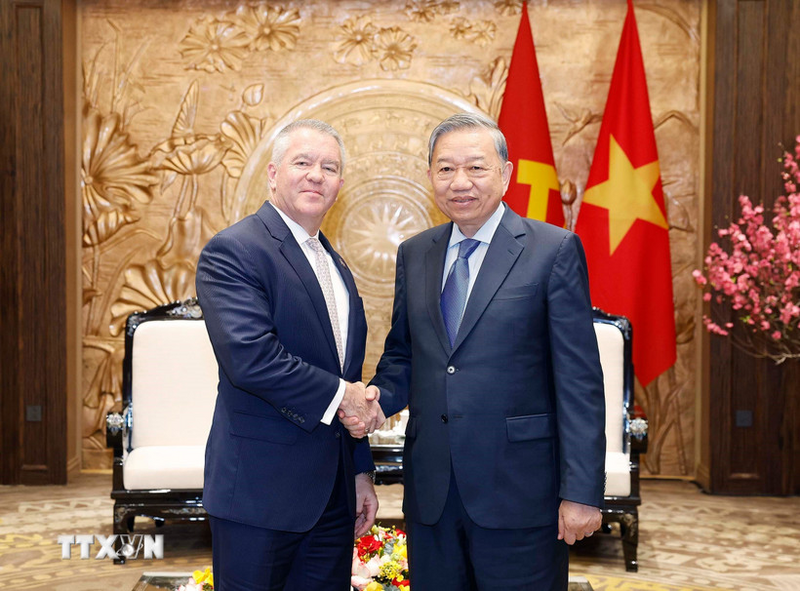
Vietnam ready to deepen comprehensive cooperation with the US
19:05 | 23/03/2025 08:30 | 15/02/2026News and Events
On the morning of October 9, 2025, at the headquarters of the Ministry of Industry and Trade, Minister of Industry and Trade Nguyen Hong Dien, Deputy Head of the National Steering Committee on International Integration and Head of the Inter-Agency Steering Committee on International Economic Integration, chaired the Committee’s first meeting since its reorganization under Decision No. 1812/QD-TTg dated August 25, 2025, issued by the Prime Minister.
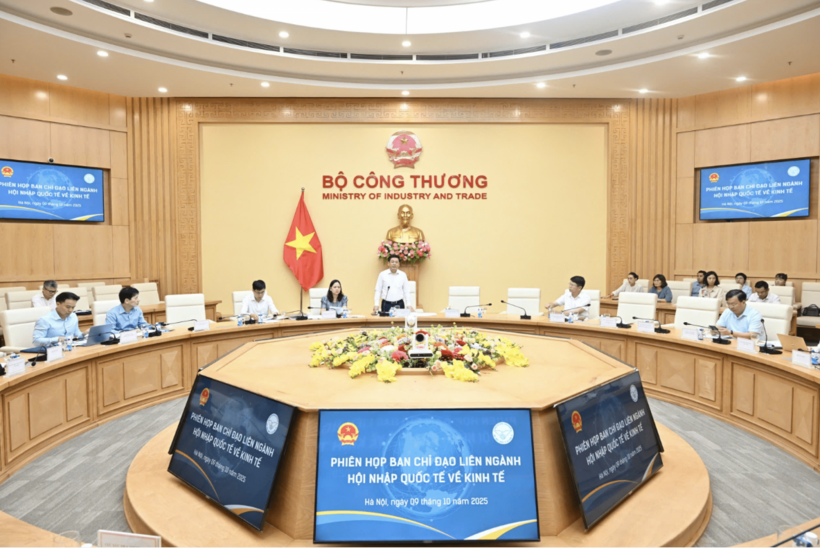
Overall view of the meeting
According to Decision No. 09/QD-BCDLNKT dated September 17, 2025, and Decision No. 15/QD-BCDLNKT dated October 1, 2025, the Inter-Agency Steering Committee on International Economic Integration consists of 15 members. Minister of Industry and Trade Nguyen Hong Dien serves as Head of the Committee, while Deputy Minister of Industry and Trade Nguyen Sinh Nhat Tan serves as Standing Deputy Head. The 13 remaining members are Vice-Minister-level leaders from nine ministries and ministerial-level agencies (Foreign Affairs, Public Security, Finance, Science and Technology, Agriculture and Environment, Construction, Culture, Sports and Tourism, Justice, and the State Bank of Vietnam), as well as four Vice Chairpersons of the People’s Committees of Hanoi, Ho Chi Minh City, Hai Phong, and Da Nang.
Minister Nguyen Hong Dien, as Head of the Committee, signed and promulgated the Working Regulations of the Steering Committee under Decision No. 12/QD-BCDLNKT and the 2025–2026 Work Plan under Decision No. 13/QD-BCDLNKT dated September 30, 2025. Accordingly, the Inter-Agency Steering Committee on International Economic Integration will convene every three months and hold extraordinary sessions when necessary, with the goal of maximizing cohesion, synchronization, and effective coordination among ministries, sectors, and localities in implementing international economic integration tasks.
Maximizing cohesion and effective coordination
In his opening remarks, Minister Nguyen Hong Dien emphasized that the meeting was of particular significance as it marked the first session of the Inter-Agency Steering Committee since its reorganization under the Prime Minister’s Decision No. 1812/QD-TTg. He stated that this was an important step forward, laying the foundation for the effective operation of the Steering Committee in the time ahead.
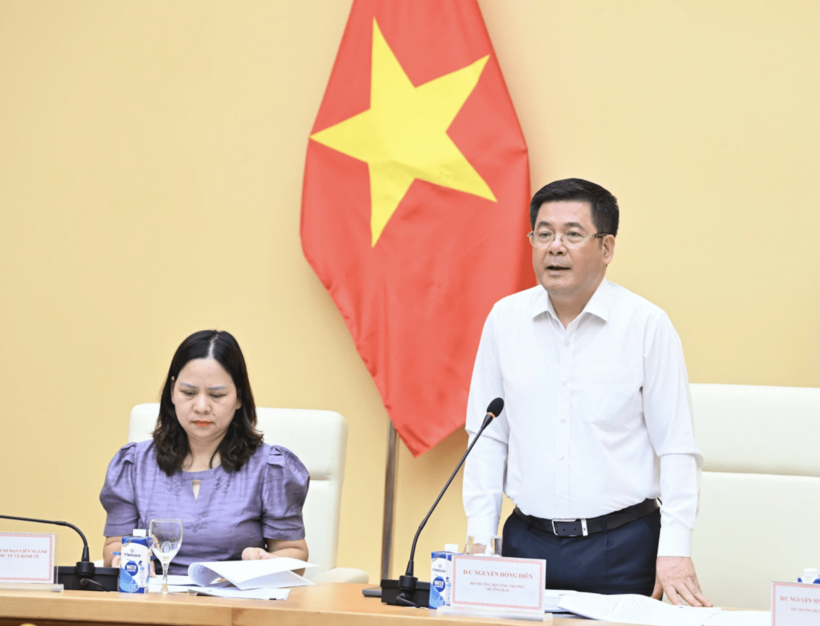
Minister of Industry and Trade Nguyen Hong Dien, Deputy Head of the National Steering Committee on International Integration, chaired the first meeting of the Inter-Agency Steering Committee on International Economic Integration following its reorganization under Decision No. 1812/QD-TTg dated August 25, 2025.
The Minister expressed his belief that the Committee would fully promote cohesion, synchronization, and effective coordination among ministries, sectors, and localities, thereby ensuring the successful implementation of international economic integration tasks and contributing substantially to the nation’s rapid and sustainable development.
Minister Nguyen Hong Dien, who also serves as Deputy Head of the National Steering Committee on International Integration, stressed that each member of the Inter-Agency Committee should act both as a focal point and a bridge in their assigned areas, thereby fostering unity in direction and consensus in implementation. He noted that this is the core value and the greatest strength of the inter-agency coordination mechanism.
Members of the Committee and delegates attending the meeting engaged in open discussions and provided practical and specific recommendations, showing that ministries, sectors, and localities have made great efforts to concretize the guidelines and resolutions of the Party and the Government. They have linked international economic integration with socio-economic development strategies in their respective sectors and regions, while maintaining close coordination in implementing free trade agreements, facilitating enterprise access to markets, expanding exports, attracting investment, and promoting domestic institutional reform.
However, members of the Inter-Agency Steering Committee also recognized that there remain numerous difficulties and challenges ahead, as the global and regional contexts continue to evolve rapidly and unpredictably. Trade conflicts, strategic competition among major powers, emerging issues such as U.S. tariff measures, trade defense lawsuits, the EU’s green technical barriers, and new requirements for sustainable development pose both short-term and long-term challenges that must be addressed.
Six key tasks
Summarizing the discussions, Minister Nguyen Hong Dien, Deputy Head of the National Steering Committee on International Integration and Head of the Inter-Agency Steering Committee on International Economic Integration, observed that after 18 years since Vietnam’s accession to the WTO in 2007, the country’s economy has firmly established its name on the global map. According to many international organizations, Vietnam’s economy now ranks 32nd in size, with one of the highest levels of openness in the world. The total value of imports and exports has grown rapidly year by year, increasing by 47% from 2020 to the present. While in 2020, total trade reached USD 545 billion, this figure is expected to hit a new record of around USD 920–930 billion in 2025.
From a self-sufficient economy, Vietnam has expanded globally through WTO accession and the signing of multiple free trade agreements (FTAs). To date, Vietnam has signed and negotiated 20 FTAs, 17 of which have entered into force or are under implementation, covering major economies that account for 90% of global GDP.
In terms of foreign direct investment (FDI), Vietnam ranks among the top 15 most successful countries in attracting FDI, particularly over the past decade, with an annual growth rate of 20–25%. The country continues to be an attractive destination for foreign investors. In the field of e-commerce, especially cross-border e-commerce, Vietnam has also recorded strong growth of about 22–25% per year, placing it among the top five fastest-growing e-commerce markets globally.
However, Vietnam’s international economic integration cannot be measured solely by the degree of market openness, the number of FTAs signed, FDI inflows, or rising trade volumes. It must instead depend on the intrinsic strength of the national economy and the extent to which Vietnamese enterprises participate in global production and supply chains.
Vietnam has achieved remarkable success in attracting investment and signing FTAs, yet the benefits derived from integration have not fully met expectations. This requires Vietnam to elevate the quality and depth of its international economic integration.
As a deeply integrated but relatively modest-sized economy, Vietnam must steadfastly uphold multilateralism and international law. The Party and the State have outlined clear policies, orientations, and strategies for successful integration. To effectively implement these objectives and enhance the role of inter-agency coordination, Minister Nguyen Hong Dien requested that members of the Steering Committee, along with ministries, sectors, and localities, focus on the following key tasks in the coming period:
First, ensure synchronized, timely, and high-quality implementation of the tasks assigned under Government Resolution No. 153/NQ-CP dated May 31, 2025, which promulgates the Government’s Action Program to implement Politburo Resolution No. 59-NQ/TW on international integration in the new context.
Second, continue negotiating and effectively implementing FTAs in line with the orientations and solutions outlined in the Prime Minister’s Decision No. 112/QD-TTg dated June 19, 2025, approving the Strategy for Participation in FTAs through 2030, with a vision to 2035. Focus on addressing existing issues to maximize the benefits of 17 signed trade agreements; further expand and diversify export markets by exploring new and potential markets in the Middle East, Africa, and Latin America; and promote negotiations for new trade agreements, such as initiating a Preferential Trade Agreement (PTA) with Pakistan and carrying out the necessary procedures to launch FTA negotiations with the GCC and MERCOSUR.
Third, prioritize resources to continue reciprocal trade negotiations with the United States, aiming to secure the most favorable commitments for Vietnam and move toward a comprehensive, fair, balanced, and sustainable trade agreement. Enhance early warning and guidance for localities, industry associations, and enterprises to respond effectively to U.S. tariff policies, promptly addressing difficulties and supporting enterprises engaged in trade with the U.S.
Fourth, promote international cooperation in new areas such as energy transition, digital transformation, circular economy, technology transfer, and the application of scientific and innovative achievements to develop foundational industries. Actively participate in developing international rules and standards for emerging technologies to ensure safety and mutual benefit, while strengthening capacity building and technology transfer within FTAs to which Vietnam is a party.
Fifth, enhance research, forecasting, and strategic advisory work; closely monitor international economic and trade developments; promptly formulate flexible response scenarios and solutions to major market and policy changes; strengthen early warning capabilities; and support enterprises in handling trade defense cases, technical barriers, and in shifting toward green and sustainable production models. Communication and education on international economic integration should be renewed and vigorously promoted through digitalization and modern communication tools.
Sixth, further strengthen the inter-agency coordination role of the Steering Committee to ensure close, seamless, and effective cooperation among ministries, sectors, and localities. The Committee should maintain regular inter-agency exchanges and consultations, not only during periodic meetings but also in day-to-day operations, to promptly address and resolve difficulties encountered during the implementation of the Government’s and the Prime Minister’s directives.
Minister Nguyen Hong Dien expressed his confidence that the cohesion, synchronization, and effective coordination among ministries, sectors, and localities will be maximized, ensuring the successful implementation of international economic integration tasks and making a practical contribution to the nation’s rapid and sustainable development.

19:05 | 23/03/2025 08:30 | 15/02/2026News and Events
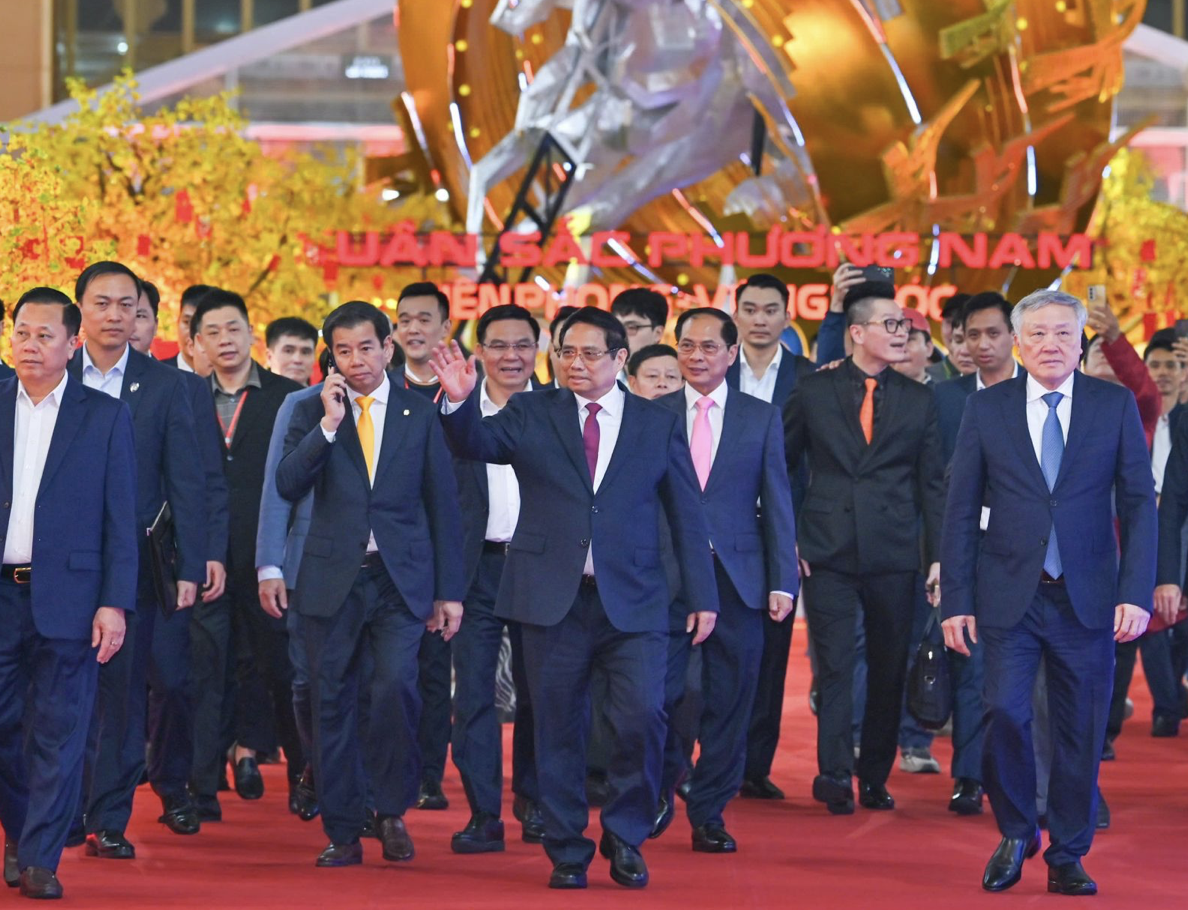
19:05 | 23/03/2025 08:25 | 15/02/2026News and Events

19:05 | 23/03/2025 16:44 | 14/02/2026Tourism
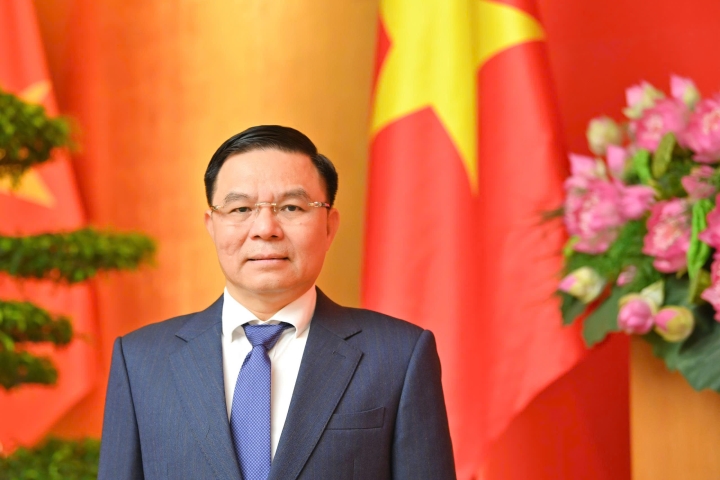
19:05 | 23/03/2025 16:33 | 14/02/2026Home Page
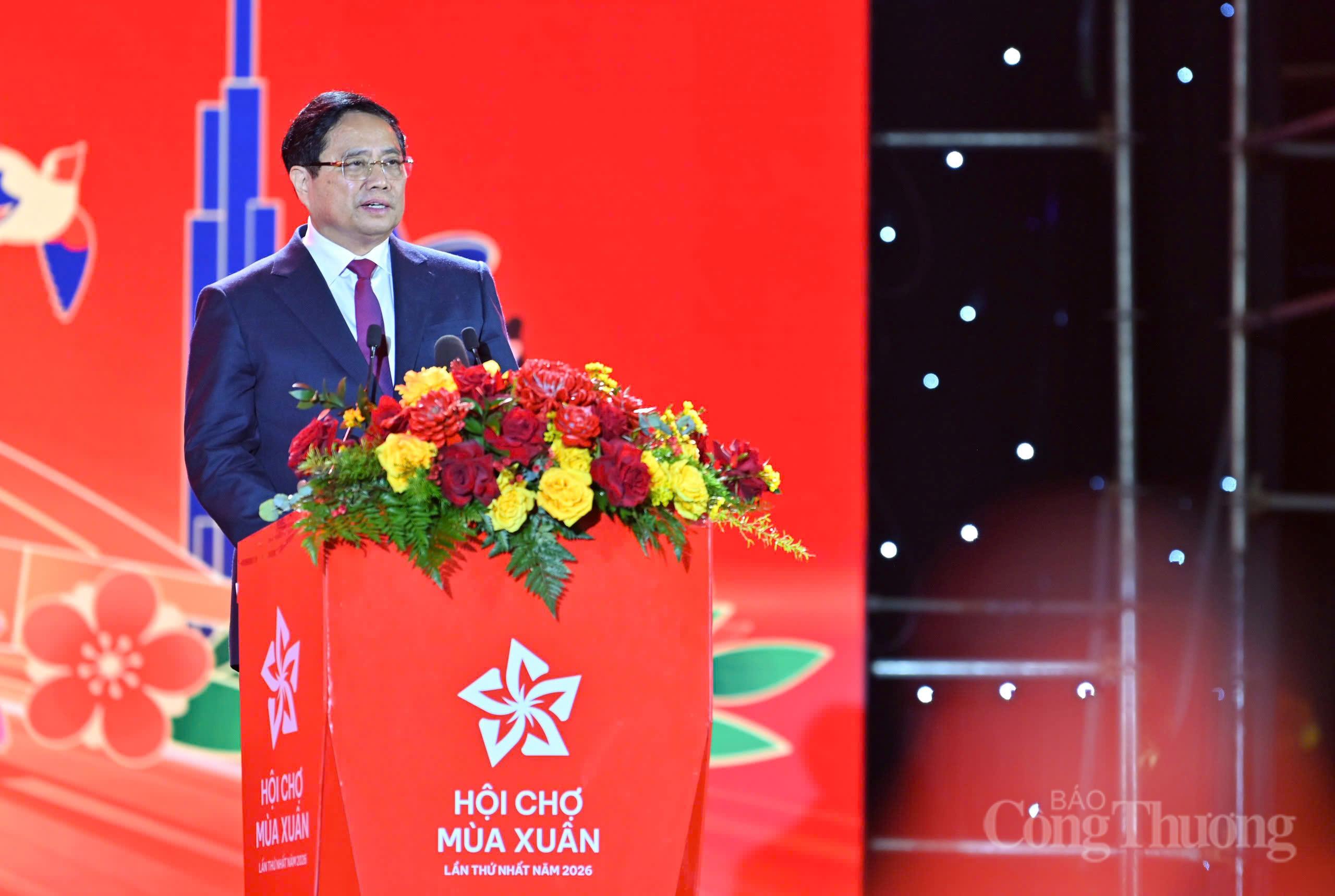
19:05 | 23/03/2025 16:32 | 14/02/2026Trade